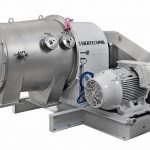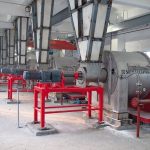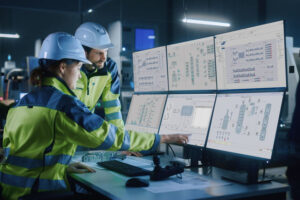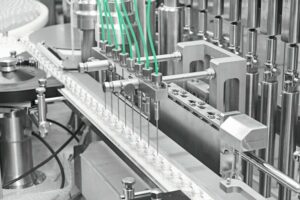Dr. Scholz, you are following in the footsteps of Karl Bongartz and Horst Dietschreit, who enjoy a very good reputation in the industry and have managed Siebtechnik very successfully for years. Isn’t such a successful duo a hard act to follow?
Dr. Reinhard Scholz: Of course, I have respect for my predecessors’ performance and for my new responsibility. However, I am not alone as company director. I have two experienced colleagues alongside me who have been managing the company for a long time. Nor am I exactly a beginner. I have more than 25 years of experience in the field of solid-liquid separation and associated equipment construction. In the past, in my various capacities at GEA, I had already worked with Siebtechnik as a supplier, so I have known the company and its market partners for many years.
What do you intend to do differently from your predecessors?
Dr. Scholz: I shall continue along the successful route set by my predecessors. However, I have retained my ability to look at the company as an outsider sees it. That helps me ask critical questions in discussions with my colleagues and identify development potential for the future.
So there is need for action in some areas?
Dr. Scholz: We have specified and prioritised a total of 20 strategic initiatives to be worked through in the coming five years. Department heads will be responsible for their implementation.
Five years are a long time.
Dr. Scholz: We’re not exactly declaring a revolution. However, conscientious implementation of the strategic initiatives – which, don’t forget, are interlinked – will take time and has to happen in parallel with normal business. That is why we settled on five years.
What important strategic initiatives does your growth concept
include?
Dr. Scholz: To start with, we have to change the way the market sees us. Many of our customers regard Siebtechnik merely as a supplier of centrifuges. We are also a supplier of solutions, however, and want to be seen as such. We need to work on that. Furthermore, Siebtechnik, as a German company, has to respond to the constantly changing global customer structure. Once upon a time our customers were local companies that ordered a centrifuge or a decanter from us. Today about 60 % of all orders are placed by internationally operating procurement organisations or via EPC contractors.
These engineering consultants are frequently based in Korea, Taiwan or the USA and build plants which could be anywhere in the world. Our job consists of coordinating our international sales & marketing activities with the requirements of globally operating EPC contractors. They have to know who we are, what we do and what our strengths are compared with our competitors. A further initiative entails optimising our service organisation.
What else will you be working on in the next five years?
Dr. Scholz: Siebtechnik is a craft centrifuge-maker. We have ten
different types of centrifuges and decanters in our portfolio that we tailor precisely to suit each customer’s needs. That is very complicated and cost-intensive. For this reason, just as people have been doing successfully in the automotive industry for years, we want to step up the modularisation of our machines by using standardised subassemblies without giving up the unique selling feature of our craft centrifuge-making in the process.
Could you give me an example to illustrate that, please?
Dr. Scholz: The Siebtechnik portfolio features various overhung-mounted machines, like the Conturbex worm screen centrifuges or the Shortbowl decanting centrifuges. The obvious thing to do here is to standardise the drive. We shall therefore be developing solutions in which a standardised drive module can be combined with different centrifuges. That will make purchasing and storage easier and production more efficient without the customer-specific character of the machine parts in contact with the product having to be modified in any way.
Everyone is talking about Industry 4.0 and digitalisation. Do these issues play a part in your strategic considerations?
Dr. Scholz: Of course they do. We are looking to see how contact with our customers can be optimised as a result of digitalisation and whether it will lead to new business models for us. And I have set myself the goal of increasing the efficiency of our own business and production processes with the help of digitalisation.
You are also planning to build a new technical centre.
Dr. Scholz: Correct. It will go up in the immediate proximity of our centrifuge technology centre that was put on stream in 2012. The new building will enable us to operate our numerous trial machines even more efficiently and in an attractive environment.
How has the workforce responded to your strategic considerations?
Dr. Scholz: We presented our strategic initiatives to the Administrative Board and the workforce in December last year. Both responded very positively. It’s a growth strategy that will fit Siebtechnik organisation-wise and economically for the challenges of the future.
Could you please give us some idea of the industries that Siebtechnik will be supplying with centrifuges?
Dr. Scholz: The global market for centrifuges is huge. We reckon that it is worth something like 1.4 billion euros, about half of which is for decanters. We’ve settled on six sectors as our target markets: recycling, inorganic salts, fertilisers, organic compounds, polymers and food & dairy.
In which areas do you see growth potential for Siebtechnik?
Dr. Scholz: For example, in the Chinese recycling industry. The Chinese are planning to re-equip some 1000 power stations with ZLD systems in the next few years.
What does ZLD stand for?
Dr. Scholz: It stands for zero liquid discharge. Pusher, decanting and worm screening centrifuges perform important solid-liquid separation tasks in these systems, which are designed to recycle and reuse all waste water and simply discharge solid waste. We have all of these centrifuge types in our portfolio. We therefore hope to be able to secure as many orders in this sector as possible. I also believe there is great growth potential in the area of inorganic salts, namely in lithium production.
Are you referring to the lithium boom?
Dr. Scholz: Yes, precisely that. The demand for high-performance batteries is constantly increasing. One reason for that is growing e-mobility. Lithium is an important constituent of these batteries. Experts anticipate that the demand for lithium will quadruple to between 400 and 500 t of lithium carbonate equivalent in the coming five years.
Which role do Siebtechnik centrifuges play in lithium production?
Dr. Scholz: Lithium occurs naturally only in small concentrations and in combination with other mineral salts. Its extraction and isolation are complex and costly, and without high-performance solid-liquid separation they are not even feasible. We are in a position to supply suitable machines for this purpose.
And what about the polymer segment?
Dr. Scholz: There we are profiting short-term from the rising demand in Asia for HDPE and PVC. Siebtechnik, with its large decanters, is very successful in this segment. I also think there is interesting growth potential in the field of organic compounds. I’m particularly referring here to the extraction of methionine and threonine. Demand for these amino-acids and their salts, which are used, for example, as additives in foodstuffs, is rising steadily. Our Turboscreen series screening decanters with their additional filter stage have proved very effective for this. And lactose manufacturing remains a further important area of application for our worm screen centrifuges and Shortbowl decanters.
Let’s talk next about the Chinese market. Siebtechnik has been very successful there in recent years. What does the future have in store for you in China?
Dr. Scholz: Even if growth slows down, China is, and will continue to be, our most important export market. However, we also have our eye on other markets that we want to concentrate on. I am thinking here especially of the American market, which we have so far served via our US sales & marketing subsidiary, Tema Systems.
Unfortunately, our American customers have not understood the split of work between Siebtechnik and Tema. This is shown, for instance, by the fact that our machines are only known there as Tema centrifuges. Our job is to ensure a uniform and transparent corporate image.
Does that apply just to America at present?
Dr. Scholz: No. It applies all over the world. International activities with our sales & marketing companies must be better coordinated, so that we are perceived externally as a single company. That will facilitate contact with the customer and help us leverage growth potential in our global markets.
Finally, a word about Achema. Which new products will you be presenting at the show?
Dr. Scholz: We shall be presenting an energy-efficient version of our SHS series pusher centrifuges. These machines consume about 15 % less electricity. Visitors will also have a chance to see our improved screening elements.
Could you explain that, please?
Dr. Scholz: Thanks to a special water-jet technology, we are able to produce screens that have a large free specific screening area and at the same time offer a high undercut. The latter ensures a considerably longer service life, especially when processing sticky products or products that tend to crystallise. We also want to demonstrate the service-friendliness of our screen baskets, which are made up of a number of screening segments. This now patented solution offers users various advantages when it comes to installation or de-installation, maintenance and storage.
Will the new, uniform company image be a big talking point at Achema?
Dr. Scholz: The Achema show offers a unique opportunity for this, of course, but there’s only a short time to go until then.
Online search: cpp0218siebtechnik
Hall 5.0, Booth C72
Author: Lukas Lehmann
Assist. Editor-in-Chief
Profile: Dr. Reinhard Scholz
Dr. Reinhard Scholz was born in Berlin on 25 May 1962. After graduating in Process Engineering at RWTH Aachen University, he took a PhD in crystallisation. He gained his first professional experience in various positions at Messo Chemietechnik, a manufacturer of crystallisation systems, before moving on to Niro Prozesstechnik, where he was company director. In 2005, he also took responsibility for GEA Messo GmbH, Duisburg. The next major career step followed in 2015, when Dr. Scholz was appointed the GEA Group’s Senior Vice President Separation Technologies. He was responsible in this capacity for all the Group’s technology-related activities in the areas of evaporation and concentration, crystallisation, distillation, membrane processes and vacuum technologies.
Since January 2017, this experienced solid-liquid separation specialist has been a Director of Siebtechnik GmbH in Mülheim an der Ruhr alongside Dr. Jürg Pollmanns and Christian Steinhaus.
„Our strength lies in solving complicated separation tasks that cannot be carried out using standard centrifuges.“








